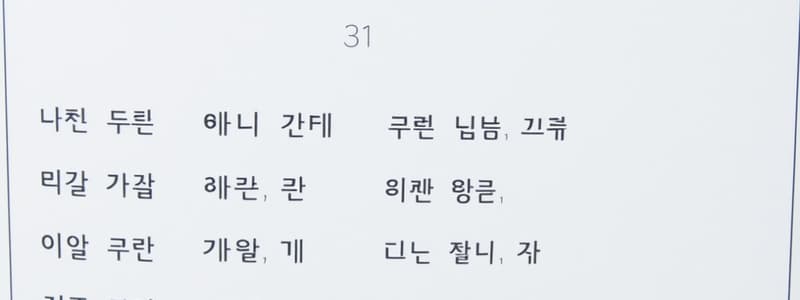Podcast
Questions and Answers
What does '진짜' mean?
What does '진짜' mean?
real, really
What does '꽤' mean?
What does '꽤' mean?
quite, rather, pretty
What does '정말' mean?
What does '정말' mean?
real, really
What does '엄청' mean?
What does '엄청' mean?
What does '되게' mean?
What does '되게' mean?
What does '너무' mean?
What does '너무' mean?
What does '많이' mean?
What does '많이' mean?
What does '어마어마하게' mean?
What does '어마어마하게' mean?
What does '아주' mean?
What does '아주' mean?
What does '굉장히' mean?
What does '굉장히' mean?
What does '매우' mean?
What does '매우' mean?
What does '상당히' mean?
What does '상당히' mean?
What does '대단히' mean?
What does '대단히' mean?
What does the phrase '진짜 예뻐요' mean?
What does the phrase '진짜 예뻐요' mean?
What does the phrase '엄청 추워요' mean?
What does the phrase '엄청 추워요' mean?
What does the phrase '대단히 감사합니다' mean?
What does the phrase '대단히 감사합니다' mean?
What does the phrase '많이 주세요' mean?
What does the phrase '많이 주세요' mean?
The expression '정말 이상하네요' means 'It's really strange.'
The expression '정말 이상하네요' means 'It's really strange.'
The word '너무' can mean 'very' in spoken Korean.
The word '너무' can mean 'very' in spoken Korean.
The phrase '눈이 ______ 많이 왔어요' means 'It snowed quite a lot.'
The phrase '눈이 ______ 많이 왔어요' means 'It snowed quite a lot.'
Flashcards
진짜
진짜
Means 'real' or 'really'; used casually but can be formal.
꽤
꽤
Translates to 'quite', 'rather', or 'pretty'. Implies something is unexpectedly beyond expectations.
정말
정말
Slightly more formal than 진짜, meaning 'really'. Modifies entire sentences.
엄청
엄청
Signup and view all the flashcards
되게
되게
Signup and view all the flashcards
너무
너무
Signup and view all the flashcards
많이
많이
Signup and view all the flashcards
어마어마하게
어마어마하게
Signup and view all the flashcards
아주
아주
Signup and view all the flashcards
굉장히
굉장히
Signup and view all the flashcards
매우
매우
Signup and view all the flashcards
상당히
상당히
Signup and view all the flashcards
대단히
대단히
Signup and view all the flashcards
Study Notes
Korean words for "Very"
-
진짜: Means "real" or "really". Used casually but can be formal.
- Example: "진짜 예뻐요" translates to "It's really pretty."
-
꽤: Translates to "quite", "rather", or "pretty".
- Example: "꽤 비싸요" means "It's quite expensive." Also implies something is unexpectedly beyond expectations, e.g., "꽤 추워요" (It's quite cold).
-
정말: Slightly more formal than 진짜, meaning "really".
- Used to modify entire sentences. Example: "정말 도움이 됩니다" means "It's really helpful."
-
엄청: Means "very" or "tremendously", slightly more intense than 진짜.
- Example: "엄청 추워요" translates to "It's tremendously cold."
-
되게: Commonly used in spoken Korean to mean "quite" or "very".
- Example: "되게 재미있었어요" translates to "It was quite fun."
-
너무: Originally means "excessively" but can mean "very".
- Officially recognized to be used as "very". Example: "너무 편해요" means "It's really comfortable."
-
많이: Means "to a great extent" or "in a large amount". Can modify verbs or adjectives.
- Example: "많이 주세요" means "Give me a lot."
-
어마어마하게: Means "tremendously" or "incredibly", more intense than 엄청.
- Example: "눈이 어마어마하게 많이 왔어요" means "It snowed a ton."
-
아주: Commonly means "very", less so in spoken contexts; it's formal.
- Example: "아주 좋아요" translates to "It's really good."
-
굉장히: Also means "very", slightly formal.
- Example: "굉장히 무거워요" means "It's very heavy."
-
매우: Means "very", rarely used in spoken contexts; formal.
- Example: "매우 훌륭합니다" translates to "It's very good."
-
상당히: Means "significantly" or "rather", more formal, less common with children.
- Example: "눈이 상당히 많이 왔어요" means "It snowed quite a lot."
-
대단히: The most formal word for "immensely" or "very".
- Example: "대단히 감사합니다" translates to "Thank you very much."
Studying That Suits You
Use AI to generate personalized quizzes and flashcards to suit your learning preferences.




